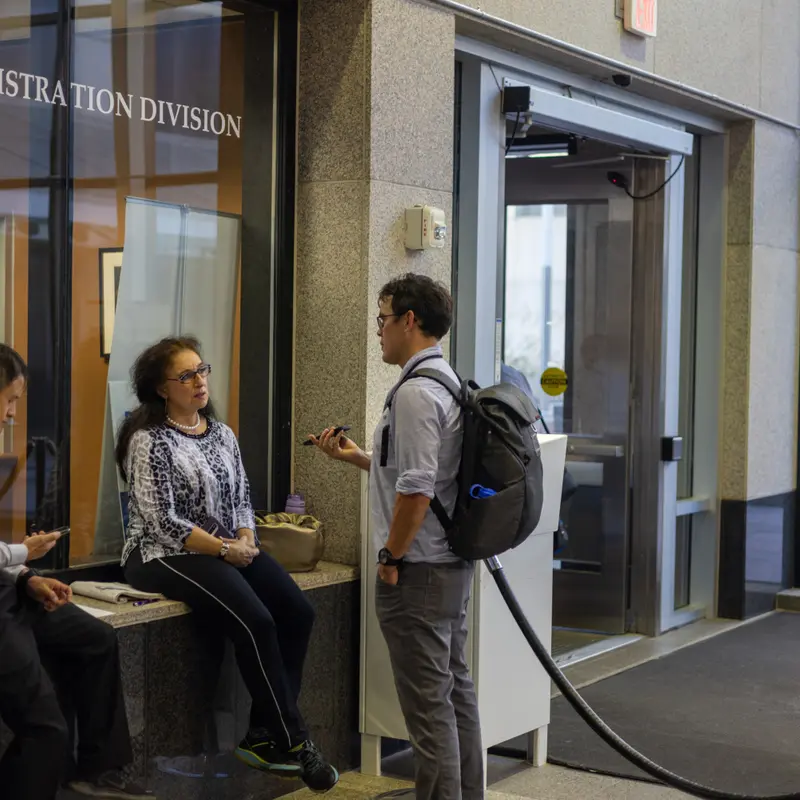ProPublica is a nonprofit newsroom that investigates abuses of power. This story was originally published in our Dispatches newsletter; sign up to receive notes from our journalists.
An Open Letter to Elon Musk
There have been internal concerns that Trump Media could be misleading investors, a source said. But with its largest shareholder about to be president, experts doubt the SEC is up to the job of investigating Truth Social’s parent company.

Series: A Closer Look: Examining the News
Elon,
I know your relationship with ProPublica got off to a rocky start when we contacted you about a story we were writing about your federal taxes. You replied with a lone punctuation mark — “?” — and subsequently called the story that mentioned you “a bunch of misleading stuff.”
We can agree to disagree on that story and a lot of other things. But we thought it might be useful to reach out again in light of your role, along with Vivek Ramaswamy, as co-head of the Department of Government Efficiency.
Simply put: If you’re trying to identify wasteful practices and spending by federal agencies, you’ll find a wealth of actionable issues that our reporting has surfaced over the past 16 years. You and Vivek noted in your recent Wall Street Journal op-ed on your plans for DOGE that “the federal government’s procurement process is also badly broken.”
Our reporting over the years provides some powerful illustrations of that point. ProPublica’s work on the Navy’s cost overruns and design flaws in its ships is second to none. We recently disclosed how Microsoft boxed its competitors out of providing cybersecurity software to the biggest government agencies, including the Pentagon. (Microsoft defended its conduct, saying in a statement that its “sole goal during this period was to support an urgent request by the Administration to enhance the security posture of federal agencies who were continuously being targeted by sophisticated nation-state threat actors.”)
Perhaps the most immediate relevance of our journalism to your work arises from your reported interest in creating a phone app that most Americans could use to file their taxes.
Good journalism makes a difference:
Our nonprofit, independent newsroom has one job: to hold the powerful to account. Here’s how our investigations are spurring real world change:

Texas lawmakers pushed for new exceptions to the state’s strict abortion ban after we reported on the deaths of pregnant women whose miscarriages went untreated.

The Supreme Court created its first-ever code of conduct after we reported that justices repeatedly failed to disclose gifts and travel from the ultrawealthy.

The Idaho Legislature approved $2 billion for school repairs after we revealed just how poor the conditions were in the state’s crumbling schools.

The EPA proposed a ban on the toxic pesticide acephate after we highlighted the agency’s controversial finding that the bug killer doesn’t harm the developing brains of children.

Support ProPublica’s investigative reporting today. Donate Now
We’re trying something new. Was it helpful?
No national news organization has been more focused on this subject than ProPublica. We have thoroughly documented why the United States is one of the only industrialized countries in the world that does not provide free filing to its citizens: Companies like Intuit that make billions of dollars selling tax preparation software have persuaded Congress to block free filing and keep their businesses alive.
I’d encourage you to take a look at the story “Inside TurboTax’s 20-Year Fight to Stop Americans From Filing Their Taxes for Free.”
You’re a busy person, so I’ll provide a TL;DR version: The tax prep industry has blocked free filing by organizing a bipartisan coalition on Capitol Hill that is anchored by House Republicans but includes Democrats like Zoe Lofgren, who represents Silicon Valley.
The industry also attracted support from longtime Republican figures like Grover Norquist, who has branded proponents of free filing as “big spenders in Washington, D.C.” who are trying to “socialize all tax preparation in America.”
As you know (or will soon learn if you pursue this agenda), despite decades of resistance, the IRS recently launched a pilot program for free filing. It works pretty well, but it’ll likely remain small scale unless something changes in the current Washington status quo.
That’s where you and Vivek have a historic opportunity.
What has always struck me about Washington is its ability to resist fundamental change. People arrive with big plans for reforms and often end up becoming part of the problem.
I began my career as a Washington reporter in 1983, two years after President Ronald Reagan took office promising to upend how business was done in the capital. Reagan was serious about coming up with some concrete ideas for saving money and reducing waste. He created a presidential commission of business executives and urged its members to work like “tireless bloodhounds.”
“Don’t leave any stone unturned in your search to root out inefficiency,” the president said.
Two years later, the commission delivered 47 volumes of reforms that it said could save $424 billion in government spending over three years. Most of the proposals required congressional action, a daunting task when the Senate was controlled by Republicans and the House by Democrats. In the end, only 27% of the recommendations were enacted. By the time Reagan’s term was over, government spending was up and the deficit had grown.
I believe Republican control of the presidency and both houses of Congress gives you and Vivek a better shot at taking on issues like free tax filing that have long been dismissed as lost causes. There’s a broad coalition of Americans who voted for Donald Trump, many of whom feel the government cares little about their problems. Politicians of both parties understand that their futures may depend on taking real, measurable steps to address those concerns.
Eliminating the annual ritual of paying money to a third party in order to tell the government what it already knows about your personal finances could be both popular and more efficient.
There has been a lot of skepticism about whether it’s possible to achieve your goal of cutting trillions of dollars from the federal budget. It appears to me that you could only rack up that level of savings by slashing everything from Medicare to military spending. I think the president’s political advisers will take the ax out of your hands before you hit the first trillion.
That’s not to say there isn’t an array of government programs that could be better run. We see our job as holding power to account, and the waste of the people’s money is one focal point of our reporting. That’s why we’ve written repeatedly about waste and fraud in Medicare and Medicaid, the government’s two biggest health care programs. (We’ve also covered the way cuts to those programs harm people.)
I have little doubt that we will write stories in the coming years that will enrage people you know. Some of our work may even focus on you or your companies. With immense power comes immense scrutiny. (As we did several years ago, we will always reach out to you for your response before we publish anything about you.)
Still, I would be disappointed if we did not also publish a piece or two that prompted you to storm into Vivek’s office and say: “Damn, this is outrageous. We could fix this.”
Best,
Steve Engelberg
ProPublica is a nonprofit newsroom that investigates abuses of power. This story was originally published in our Dispatches newsletter; sign up to receive notes from our journalists.
ProPublica is a nonprofit newsroom that investigates abuses of power. This story was originally published in our Dispatches newsletter; sign up to receive notes from our journalists.










